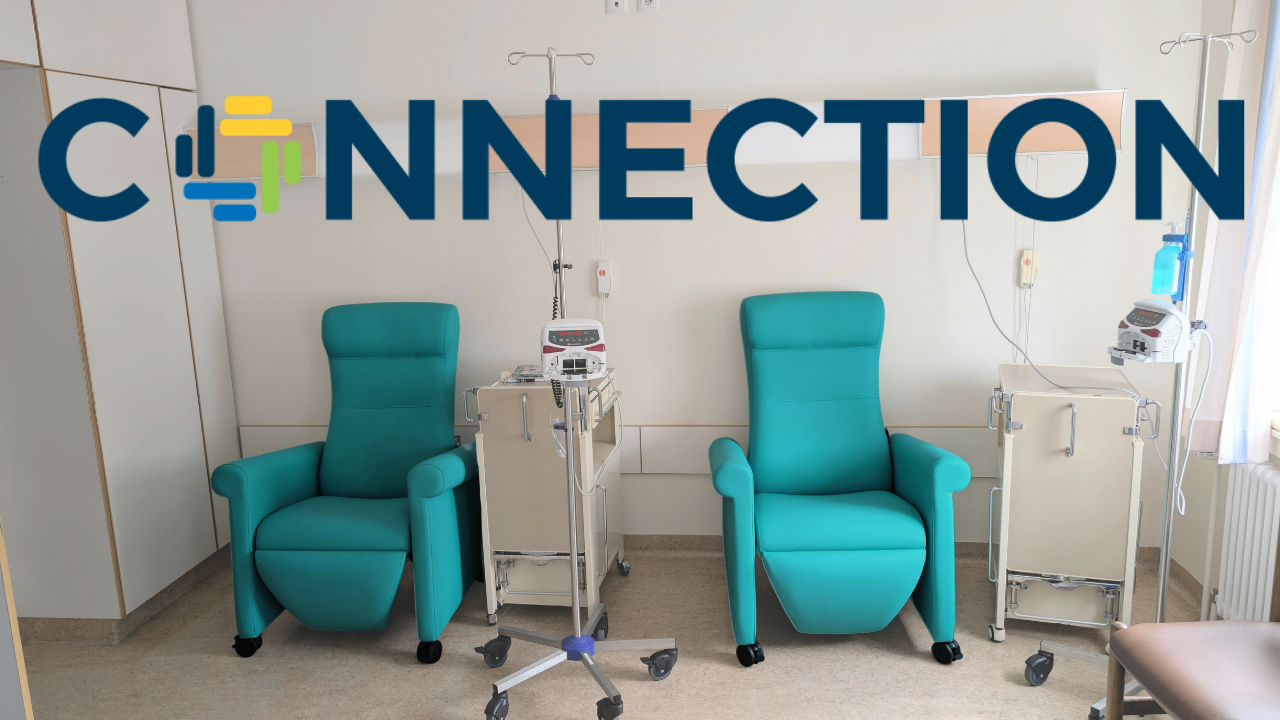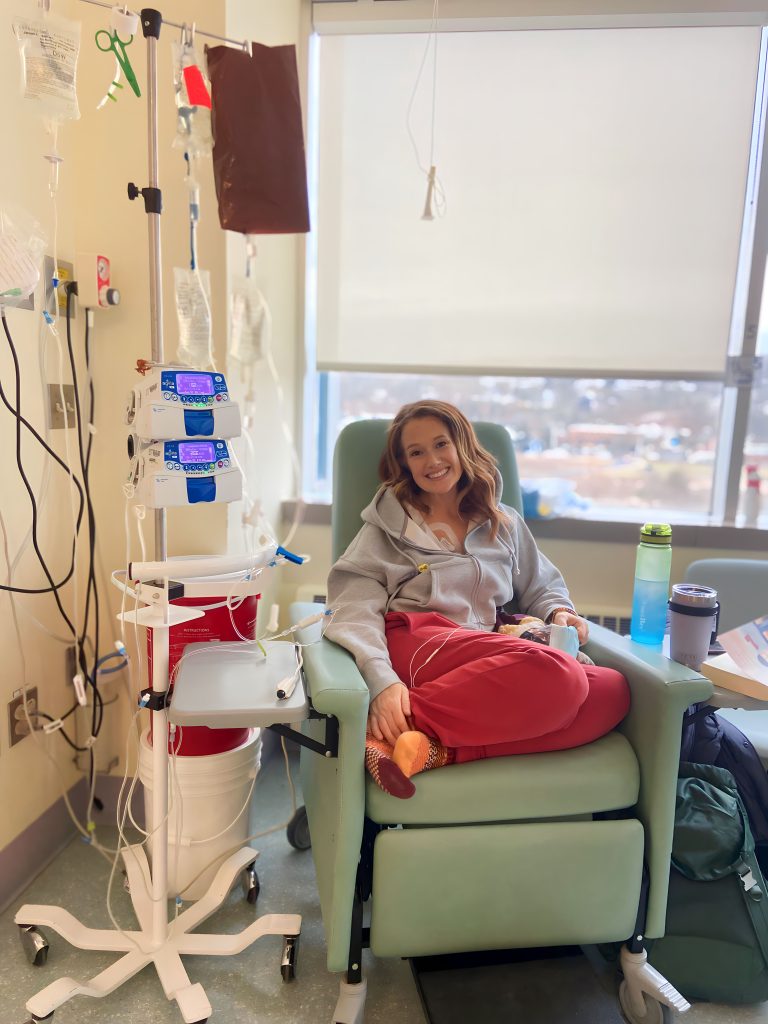
By Michelynn Touesnard, MSW
Waking up from my fourth procedure and second major surgery, I found myself medicated but still conversational. I remember pieces of my conversation with the nurse in my recovery unit, as I answered her questions and explained what I did for a living (well before all of this cancer stuff). She asked about trauma symptoms and the treatment experience, with tears in her eyes. When I said that people don’t have to suffer, they can and do get better, I remember the tears that were hanging on finally fell. Our hospital staff are burnt out. They want to provide care that the system does not currently allow. I will assume that this is causing all sorts of moral-based injuries.
As a 43-year-old mother of four, middle class, masters educated, white woman, who has worked in healthcare for many years, I have still found it challenging to navigate a stage 4 colorectal cancer diagnosis in our health care system. Nova Scotia’s Quality and Patient Safety Framework (2021) aims for our province to provide health care that is safe, appropriate, people-centred, integrated, and accessible. With the risk of sounding ungrateful, though I assure you I am not, my hope is to bring attention to the gaps in care.
In January 2023 I noticed symptoms that were concerning and went to see my doctor. I was referred to the GI clinic eventually as symptoms worsened. I was told by this clinic it would be over a year wait because I was not considered urgent. I had all the symptoms of colorectal cancer, but I was not over 50, had no family history and my bloodwork was “good.” By the time I was able to be diagnosed I was already stage 4, incurable. It took me nine months to be diagnosed, and it was not for the lack of trying. I went to emerge, I called the GI clinic in tears, I begged for someone to help me. The emerge doctor rubbed my back and told me he would send the clinic a note considering how anxious I was. I explained I had four children and two jobs; I wouldn’t have made time to be at the hospital unless I felt it was an emergency. Trusting the processes and the system after was difficult for me, and it still is if I am being honest.
Amongst the amazing nurses and surgeons and care, I have experienced some very difficult things.
- When I arrived to what I thought was my last day of chemotherapy I was told by my nurse that I was mistaken; I actually had three more months, they had just forgotten to tell me.
How do you feel included in your care, when huge decisions like this are made without you?
- I went through three oncologists within my first year of diagnosis as well as three GI surgeons.
How do you build rapport and trust when your life is on the line, in these circumstances?
- I had complications during a liver ablation that landed me in the Intermediate Care Unit (IMCU) and at one point asked to speak to the on call doctor because of some significant things that were happening; my PICC line was touching my heart and causing it to irregularly beat, and the nurse gave me a blood thinner just hours after I had been given a coagulant because my liver was bleeding. The doctor was visibly irritated with my questions and offered me anxiety meds. I often wonder:
How would five minutes and some compassion have felt for me?
- That same visit I had a man with dementia who had been sexually harassing the nurses all day try to sneak behind my curtain in our ward room around 4 a.m.
Is there a way to more appropriately consider safety concerns when assigning patients to rooms?
- In the IMCU where the ratio is two patients per nurse, my care was top tier. But during my bowel resection surgery my roommate’s nurse left used adult diapers in the sink in our shared bathroom on two different occasions.
Is this a result of nurses with too many patients?
- I had a male roommate post liver surgery who screamed and yelled and threatened physical harm to me throughout the night. I watched the nurses trying to deal with him and they all would leave the room looking defeated. My husband called the nursing station as soon as he found out and requested a security guard be put outside my door. When my husband confronted my roommate and told him not to threaten me anymore, he attacked. My husband then restrained my roommate until hospital staff arrived because a security guard was not put there. After this incident, I cancelled my lung surgery that was to be at the same time as the second liver surgery, because the thoughts of having complications and needing to stay in the hospital longer seemed worse than just waiting to get the surgery in a few months. When my surgeons heard about what happened to us, one of them said, “I’m surprised it doesn’t happen more often to be honest, the way they stack people in together”. When I explained this story, some friends asked:
Why didn’t you press the button to get help?
And I suppose it’s the same reason I didn’t write the complaints, or letters of feedback for the other issues. The system is so broken I didn’t believe there was going to be measures in place to keep me safe anyhow. The button is the metaphorical safety net of our entire healthcare system. A facade. Much like the zero tolerance posters hanging on the walls.
My experiences in our system have, on too many occasions, not been safe, appropriate, people-centred, integrated, or accessible. When I think about myself with all of my resources and supports and how difficult all of this has been to navigate and manage, I have to ask: what is it like for people who are disempowered, who don’t work in healthcare, or who have socioeconomic barriers or language barriers?
I hope that talking about this will help people learn to advocate, question, and ask for better care. I hope healthcare workers recognize the gaps themselves, advocate for change on their end, and demand better for their patients and for themselves.
I also hope that social workers find a role in advocating in order to promote safe, appropriate, people-centred, integrated, and accessible care, specifically by not getting caught up in the culture of apathy and instead speaking out and insisting on the need for change. The continued erosion of our healthcare system will lead people no choice but to bankrupt themselves seeking private options. We don’t need privatization; we need properly funded care that is available to everyone. We need to do better because everyone is suffering in our current system: the patients, the families, and the healthcare workers.

Michelynn Touesnard, MSW, practiced clinical social work for families and members of the Canadian Armed Forces out of Greenwood/ Eleke’we’katik and Halifax/Kjipuktuk since 2012. The last five years had a trauma focus while being part of the Operational Trauma and Stress Support Centre team treating operational trauma injuries.
Currently residing in Berwick with her four daughters and partner of 18 years, Michelynn has been on medical leave while going through cancer treatments; October 16, 2025, was the two-year anniversary of her cancer diagnosis.






Michelynn, thank you for sharing your journey and these important reflections for social workers and helpers.
Sorry you had to go through this, it’s hard enough but to have all this it’s uncalled for. Premier Houston should be doing something about this instead allowing people to hunt on Sunday🤦🏼♀️ who cares. I also work in health care and the frontline workers- nurses do there best but really have no say. Something has to be done now or someone will get hurt. Hope everything goes Good for you🩷
My heart aches for you being so young with four children. I also work in Healthcare and have wondered how alienated folks who do not work in the field must feel, how scared, how confused, how powerless. Thank you for sharing your story. I believe it will bring peace to others having some of the same questions to feel less alone.
Thank you Michelynn for sharing your experiences. Each incident in isolation is problematic but when you string them together it shows how deeply wounding the system can be. What is intended to help is actually causing harm. ❤️🩹
Thank you for sharing your story and I hope you are on a long road to recovery and brighter days to enjoy your family! I am not in healthcare but I had a front row seat of our healthcare system when my sister was diagnosed with pancreatic cancer last September! I am thankful I was able to be with her for most of her journey. But you are so right you need to be your own advocate or have someone do it for you (she was too weak to do it herself during complication after complication). She could probably write a book about her experience! The most frustrating part for me was that there seemed to be so much secrecy. You only seem to get vague answers and then another complication and/or surgery to fix something you didn’t know anything about. It was brutal to say the least. The charts at VG were paper??? Her binder was 3” thick. How can nurses during shift change keep up with a complicated situation. Unreal. Glad you’re doing better! My sister is too 🫶🏻
I hope you receive all the care you need to be there for your family . Sounds like you suffered Enough.
I on the other hand was in the Cumberland Regional Hospital in June. I needed help getting up to pee on a few occasions . 2.evenings in a row ……the nurses working the overnight shift ( as well as the Dr on call were having a great time laughing and chatting and discussing their weekend birthday party they were planning I waited 42 minutes for someone to help.
I am a retired nurse from the Annapolis Valley . And yes if we were not busy w would enjoy our laughs and conversations but not when we were NEEDED .
I agree changes are needed……the healthcare system needs to change but being in. And out of a few different hospitals over the past 6 years with my husband or parents…….the “ new”. Nurses need to realize they are not there just for a pay cheque. Put In the work, show compassion and do your job!!
Healthcare needs help immediately. Please, put funds available for more staff and resources for them in our communities.
Truthfully, I can barely believe half of it but I know it’s all true! You’re a beautiful young lady. It was brave of you to write all this information and you did it in such a way that it easy to understand. Sounds like a very scary place… The hospital. I’ve read many times at the health system is broken. You are living proof of this. I hope you recover and can go home for good.